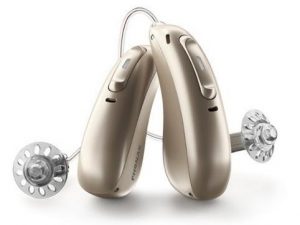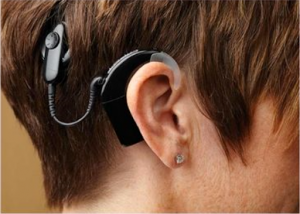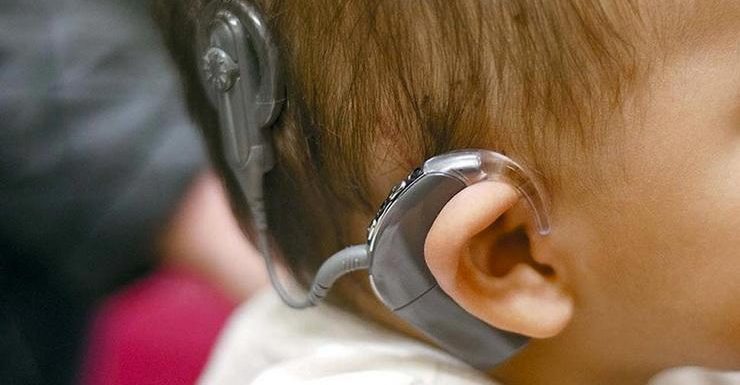You may be familiar with hearing aids – it’s a small device you wear on your ear to help you hear better. But you might have heard of cochlear implants as well when looking at topics related to hearing loss and hearing aids. What exactly are cochlear implants and how are they related to hearing aids?
Though this article will help to better understand the differences between hearing aids and cochlear implants, it is not written with the intention of providing medical advice. If you are considering getting hearing aids or cochlear implants for hearing loss issues, seek a trained audiologist.
What are Hearing Aids?
Hearing aid devices are small powerful devices that you wear on your outer ear or inside your ear to boost your hearing. They are suitable for users with mild to severe hearing loss, and can even manage tinnitus, a common medical condition experienced by patients with moderate to profound hearing loss.

There are 3 types of hearing loss, which are sensorineural, conductive, and mixed hearing loss. Hearing aids are able to help patients with any of the 3 types of hearing loss to hear properly again. There are also many different styles of hearing aids, such as Behind-The-Ear (BTE) hearing aids, In-The-Ear (ITE) hearing aids, and Completely-In-Canal (CIC) hearing aids etc. Each cater to the different needs that a person has for their hearing loss. Though many different types of hearing aids exist, all hearing aids use the same 3 basic components to help the user hear.
All hearing aids have a microphone, amplifier (or speech processor), and a speaker. The microphone picks up sounds from the user’s surroundings and sends it to the amplifier, where it is processed and adjusted to the right volume for user. Signals are then sent from the amplifier to the speaker and is heard by the user.
Some hearing aids are also capable of adjusting to their environment, namely minimizing background noise and enhancing voices so that the user can hear others clearly even in noisy situations.
What are Cochlear Implants?
Cochlear implants are electronic devices meant for users with profound hearing loss, having both an external component and an internal component. As the name suggests, a cochlear implant surgery is required behind the ear in order to install the internal part of the implant, which is a very simple and safe procedure. The internal component consists of a thin wire with electrodes, and is inserted into the cochlear – a spiral-shaped organ inside your ear that helps you hear.
The external component on the other hand is where the microphone and amplifier is found, and is placed behind the user’s ear – just like a normal hearing aid would.

Similarities and Differences
Both hearing aids and cochlear implants share one major similarity. They help users with hearing loss, who often struggle with hearing what people are saying especially in noisy environments or even in quiet settings, hear much better and improve their quality of life.
Cochlear implants can only help patients with sensorineural hearing loss
Cochlear implants however, are also very different from hearing aids in multiple aspects. First of all, cochlear implants can only help patients with sensorineural hearing loss. Sensorineural hearing loss is where the inner ear – not the outer ear, is not functioning properly. Specifically, the cochlear is not working properly.

The cochlear consists of many cells called hair cells, which are responsible for detecting sound waves, and sending electrical signals to the brain. When these hair cells are damaged – either due to old age or prolonged exposure to loud noises, they become less effective at sending electrical signals to the brain. As a result, the person’s hearing ability worsens and would be diagnosed with sensorineural hearing loss. Cochlear implants can only be effective for a patient with sensorineural or mixed hearing loss, whereas hearing aids can cater to patients with sensorineural or conductive hearing loss (i.e. sound has difficulty reaching the inside of the ear through the ear canal), or both.
Cochlear implants are much more powerful
Secondly, though hearing aids are capable of accommodating a wide degree of hearing loss, they are not as powerful as cochlear implants when it comes to alleviating hearing loss. The main reason being that hearing aids relieve hearing loss by passing sound through the ear canal, which is then received by the inner ear, then sent to the brain. Cochlear implants on the other hand bypasses most of the steps to hearing sounds, by sending sounds directly to the cochlear, and is thus more effective.
Additionally, when patients start to experience difficulties in understanding speech even with a hearing aid, cochlear implant is an option.
Which one to choose?
For most people, hearing aids are sufficient in dealing with hearing loss. However, if you’re experiencing severe to profound hearing loss, in some cases hearing aids might not be able to help you hear properly and you might require a cochlear implant. It is best to consult a trained audiologist who is capable of diagnosing your degree of hearing loss and assess whether or not a cochlear implant is suitable for you.
Other important considerations
There are also many other points that one should consider when deciding whether or not to go for a cochlear implant.

Cost
Because cochlear implants require surgery and are much more powerful than hearing aids for dealing with hearing loss, they will cost more.
Durability or Lifespan
Though cochlear implants may cost more upfront, they are designed to last a lifetime. Hearing aids on the other hand last on average about 5 years or longer if they are well-taken care of.
Appearance
Though hearing aids are less conspicuous, the external component of the cochlear implant is still very much visible on the user’s side of the head. Though there is nothing wrong with using a cochlear implant for your hearing needs, it might be a point of consideration for some people.
Cochlear implants are completely silent
Because cochlear implants work by sending electrical signals directly to the cochlear, no sounds are produced and is thus completely silent. In contrast, hearing aid users and people around them sometimes may hear their own voices, especially if the user is experiencing severe hearing loss and the hearing aid is adjusted to produce louder sounds. Users may also experience feedback with hearing aids but this never happens with cochlear implants.
Hearing aids may produce more natural sounds
For hearing aids, because sounds travel through your ear canals, sounds are much more natural when compared to that from cochlear implants, where the signals bypasses the ear canal and goes directly to the cochlear.
Time needed to get used to
Because sounds produced by a hearing aid is more natural, it takes a shorter period of time to get used to than cochlear implants.
Conclusion
Even though hearing aids and cochlear implants both serve the same purpose – to help people deal with hearing loss, cochlear implants are much more suitable for people experiencing severe hearing loss and have difficulty understanding speech. Though in some cases hearing aids might still help do the job, cochlear implants may be necessary in order to minimize or prevent adverse outcomes, like impairment of language and social skills in children, or dementia in older patients.
Get A Hearing Test In Singapore At The Hearing Centre
If you are unsure whether hearing aids or cochlear implants are right for you, a hearing test in Singapore can be done at ear specialists like The Hearing Centre in order to help you make the right decision.
The Hearing Centre is a hearing care specialist in Singapore with almost 2 decades of presence in the industry. With a team of highly experienced and skilled audiologists, we will walk you through the entire process of getting a hearing aid with the utmost warmth and care, from the diagnosis to fitting and after-sales service including repairs and adjustments.
Apart from high-quality yet fairly priced hearing aids from the most advanced brands in the market, we are proud of our personalized services using state-of-the-art technology to suit every individual’s needs.
